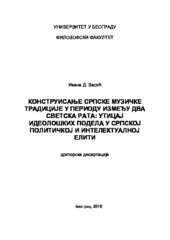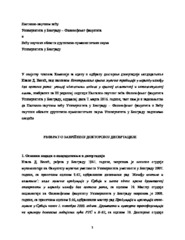Приказ основних података о дисертацији
Конструисање српске музичке традиције у периоду између два светска рата: утицај идеолошких подела у српској политичкој и интелектуалној елити
Construction of Serbian musical tradition in the period between the two world wars: the impact of ideological divisions in the Serbian political and intellectual elite
| dc.contributor.advisor | Molnar, Aleksandar | |
| dc.contributor.other | Spasić, Ivana | |
| dc.contributor.other | Subotić, Milan | |
| dc.creator | Vesić, Ivana D. | |
| dc.date.accessioned | 2017-04-10T13:55:36Z | |
| dc.date.available | 2017-04-10T13:55:36Z | |
| dc.date.available | 2020-07-03T09:53:51Z | |
| dc.date.issued | 2016-09-09 | |
| dc.identifier.uri | http://eteze.bg.ac.rs/application/showtheses?thesesId=4744 | |
| dc.identifier.uri | https://nardus.mpn.gov.rs/handle/123456789/7849 | |
| dc.identifier.uri | https://fedorabg.bg.ac.rs/fedora/get/o:15007/bdef:Content/download | |
| dc.identifier.uri | http://vbs.rs/scripts/cobiss?command=DISPLAY&base=70036&RID=527590295 | |
| dc.description.abstract | У овом раду смо разматрали процес конструисања српске музичке традиције схваћен као скуп тумачења српске музичке прошлости, садашњости и будућности утемељених на различитим вредносним позицијама које су заступали припадници интелектуалне и политичке елите у међуратном југословенском друштву. Установили смо да су у наведеном историјском периоду делови српске и југословенске елите интензивно радили на стварању „идеалног типа“ националне културе уопште и музичке традиције конкретно да би га затим имплементирали путем културне и образовне политике. Иако је циљ већине интелектуалаца, политичара и музичких стручњака и уметника било стварање нове, југословенске културе и уметности, услед регионално-етничке подвојености која је била изражена од настака југословенске државе до њеног распада, појединачне националне традиције нису изгубиле на значају. Захваљујући томе, могуће је и оправдано да се говори о српској музичкој традицији упркос југословенском контексту. Ослањајући се на конструктивистичке теоријске поставке нације и националне културе и из њих произашла истраживања намера нам је била да пратимо како су се погледи делова елите на обликовање југословенског друштва и културе рефлектовали на формулисање музичке политике или, прецизније, на дефинисање праваца и циљева музичког развоја на овом простору. С тим у вези, од посебне важности било нам је уочавање корелације између, с једне стране, идеолошких подела међу југословенском интелектуалном и политичком елитом и креирања дистинктивних музичких програма. Како би се извршило поређење вредносних оквира и принципа на којима се заснивало политичко, друштвено и јавно делање припадника елите са вредностима које су пропагиране кроз различите врсте активности у вези са музиком (музичко стварање, извођаштво, публицистика, научно-истраживачки подухвати) било је потребно да се анализа усмери у неколико праваца. Најпре, имајући у виду чињеницу да је у периоду између два рата јавно поље било кључно место сусрета друштвено утицајних и мање утицајних појединаца и група, те оних који су деловали у различитим друштвеним областима – научно поље, бирократско, уметничко, новинарско, музичко итд., сматрали смо да је од изузетне важности сагледавање његове структуре, тачније релација које су се развиле унутар његових граница... | sr |
| dc.description.abstract | In this dissertation I analyse the process of constructing Serbian musical tradition, understood as a collection of interpretations of Serbian musical past, present and future which were based on different value positions espoused by members of the intellectual and political elite in the interwar Yugoslav society. I found that, during this historical period, certain parts of Serbian and Yugoslav elite worked intensively towards creating an “ideal type” of national culture in general and music tradition in particular, in order to implement it by means of cultural and educational policies. Although the goal of the majority of ntellectuals, politicians and music experts and artists was to create a new Yugoslav culture and art, due to the regional-ethnic dichotomies that had been evident since the formation of the Yugoslav state until its dissolution, individual national traditions did not lose their significance. As a result, it is possible and justified to talk about Serbian musical tradition despite the Yugoslav context. Relying on some constructivist theoretical assumptions about the nation and national culture, and the research that has emerged from them, my intention was to keep track of how the views of some members of the elite about the shaping of Yugoslav society and culture were reflected in the formulation of musical policies or, more precisely, on the definition of the aims and objectives of musical development in this area. With respect to that, I found it particularly important to observe the correlation between, on the one hand, the ideological divisions among the Yugoslav intellectual and political elite and, on the other hand, the creation of distinctive music programs. In order to compare the value frameworks and principles on which the political, social and public actions of members of the elite were based with the values that were propagated through different types of activities related to music (such as musical creation, performance, press, science and research ventures), it was necessary to aim the analysis in several directions. First, given the fact that in the period between the two world wars the public field was a key meeting place of the socially influential and less influential individuals and groups, as well as those who worked in different social areas — such as the scientific field, bureaucracy, art, journalism, music, etc. I considered it paramount to analyse its structure, i.e. the relations that have developed within its borders... | en |
| dc.format | application/pdf | |
| dc.language | sr | |
| dc.publisher | Универзитет у Београду, Филозофски факултет | sr |
| dc.rights | openAccess | en |
| dc.rights.uri | https://creativecommons.org/licenses/by-nc-nd/4.0/ | |
| dc.source | Универзитет у Београду | sr |
| dc.subject | јавно поље | sr |
| dc.subject | public field | en |
| dc.subject | intellectual elite | en |
| dc.subject | political elite | en |
| dc.subject | national culture | en |
| dc.subject | national identity | en |
| dc.subject | ideology | en |
| dc.subject | construction of tradition | en |
| dc.subject | narratives on music | en |
| dc.subject | The Kingdom of Serbs | en |
| dc.subject | Croats and Slovenes | en |
| dc.subject | интелектуална елита | sr |
| dc.subject | политичка елита | sr |
| dc.subject | национална култура | sr |
| dc.subject | национални идентитет | sr |
| dc.subject | идеологија | sr |
| dc.subject | конструисање традиције | sr |
| dc.subject | наратив о музици | sr |
| dc.subject | Краљевина СХС/Југославија | sr |
| dc.subject | The Kingdom of Yugoslavia | en |
| dc.title | Конструисање српске музичке традиције у периоду између два светска рата: утицај идеолошких подела у српској политичкој и интелектуалној елити | sr |
| dc.title.alternative | Construction of Serbian musical tradition in the period between the two world wars: the impact of ideological divisions in the Serbian political and intellectual elite | en |
| dc.type | doctoralThesis | en |
| dc.rights.license | BY-NC-ND | |
| dcterms.abstract | Молнар, Aлександар; Суботић, Милан; Спасић, Ивана; Весић, Ивана Д.; Konstruisanje srpske muzičke tradicije u periodu između dva svetska rata: uticaj ideoloških podela u srpskoj političkoj i intelektualnoj eliti; | |
| dc.identifier.fulltext | https://nardus.mpn.gov.rs/bitstream/id/25452/IzvestajKomisije8148.pdf | |
| dc.identifier.fulltext | http://nardus.mpn.gov.rs/bitstream/id/25452/IzvestajKomisije8148.pdf | |
| dc.identifier.fulltext | http://nardus.mpn.gov.rs/bitstream/id/25451/Disertacija.pdf | |
| dc.identifier.fulltext | https://nardus.mpn.gov.rs/bitstream/id/25451/Disertacija.pdf | |
| dc.identifier.rcub | https://hdl.handle.net/21.15107/rcub_nardus_7849 |



